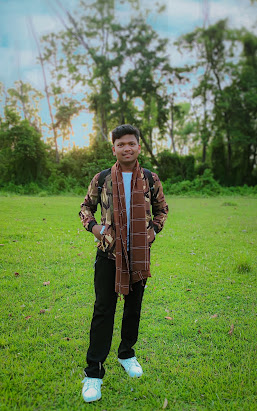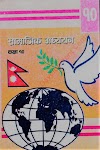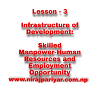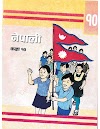Class 10 social guide
Social guide
Lesson - 2
Folk Songs of Nepal
Very Short Answer Questions
1.Define folk song?
Ans:A traditional song originating among the people and has been passed down orally from one to next generation is called folk song.
2.What type of song is Tamang Selo?
Ans:Tamang Selo is popular song of Tamang
community living in hilly districts of province
no. 3.
3.Name any two folk songs and the community related with them.
Ans:Following are the folk song and community:
Songs Community
Kaura Magar
Syabra Sherpa
Short Answer Questions
1.Give a short introduction to Deuda song.
Ans:Deuda is popular song of province no. 7. Deuda is regarded an important genre of Doteli folk song. It has historical importance in which tune is given more importance.
In Deuda song, a complete line of song is sung and half of the same line is repeated.
For eg: Rai Jhuma Jhuma Kya Maskya Ki Chaa Ho, Rai Jhuma
Deuda song is sung in different festivals, fairs, Jatras and other occasions. It is popular among very caste, race, class, gender and community.
2.Write a stanza of a folk song that you know or have collected, and give its short introduction.
Ans:[Students can write any songs with a short description of their own.]
3.Write a dialogue on the topic "Folk songs are our fundamental identity".
Ans:(Rima and Sima are the students of grade 10. Rima is singing hindi song in her room
at the mean time Sima enters]
Sima :Hello Rima. Are you singing hindi song? Can't you sing Nepal folk song?
Rima: (looking at Sima). I feel ashamed while singing folk song
Sima:Oh! Why so? Don't you know because of such attitude of yours and other
young generation soon our folk songs will extinct.
Rima: Hmmm... I'm aware of this fact. But still I don't feel connected to our folk songs.
Sim:a That's because you don't value our tradition and culture. You are so engrossed in modern and western culture that you have forgotten about our folk songs and dances. Folk songs and dances are our fundamental identity
Rima: Yeah I've heard this before too. But how folk songs and dances are our
identity?
Sima:Our country is multi-lingual, mult-cultural and multi-ethnic. About 125
different castes of people live here. Because of lingual and cultural diversity.
there is diversity in songs and music. They are typical and melodious too.
Each community and ethnic group have their own folk songs and dances
that they perform during festivals, fairs, ceremonies etc. Such distinct songs
and dances give individual identity to them.
Rima:Oh! Now I understand. From today onward, I would engage myself to promote and preserve our folk song and culture
4.Suggest any four effective ways to preserve and promote folk songs.
Ans: Any four effective ways to preserve and promote folk songs are
•Organize folk song singing competition
•Make the provision of royalty and respect to creators
•Formulate and implement policy to preserve and promote folk song
•Add quality in folk songs lyrics, rhythm and tunes to match the contemporary interest.
•Encourage different communities to preserve their folk songs.
5.What are folk songs? In what occasion folk songs are performed? Name any two folk songs practiced in your community.
Ans:The songs that are sung according to place, culture, race, etc are called folk song Folk songs are performed in various festivals, ceremonies, Jatras and other rituals. The two folk songs practiced in my community are Malshree song and Teej song
6.Collect the songs that you have heard in various places and occasion. Write them down with the places where it is sung and the occasions. Also mention which races of or religion those songs belong to.
Ans: Song:.
7.Name the festivals and folk songs that you observe throughout the year.
Ans:The following are the festivals and songs that I celebrate throughout the year:
8."The folk song reflects or represents the culture of contemporary society." Justify the statement along with an example of any folk song.
Ans:The fundamental song of any local community or cultural group is called folk enn The folk song of any particular community reflects lifestyle, festivals situation, economic activities and various aspect of culture of that cc 13/34 song also reflects contemporary social events, social relation and in example the song sung by Dharma Raj Thapa:
हरियो ढांडा माथि हलो जोले साथी हो हो मा हो हो हो हो हो हो
The above song represents the geographical condition of the society, economic
activities of the people and the contemporary technology. Similarly, another example
is:बारी जमुना पारी जमुना
जमुनाको फेदैमा मनकामना
एकादशी बजारैमा
फन्के रोर्टी थालमा हो एकादशी बजारमा
Hilly area, river in between the hills, tree-Jamuna, Ekadashi bajar, sel roti, etc. mentioned in the above song represent geographical and cultural situation of that
society. In this way, folk song reflect contemporary society and culture.
9.Give a brief introduction of a famous folk singer Jhalakman Gandarbha and singer Tara Devi.
Ans:Jhalakman Gandarbha:
Jhalakman Gangarbha was a pioneer figure to develop the folk song in Nepal. He was born at Batulechaur, Pokhara on 12 Baisakh 1992 BS. Jhalakman could not get any formal education. Since the age of nine he started to play
Sarangi and sing folk songs like his forefathers. He started to collect the folk songs around the villages of Kaski district. He also composed the songs by himself. He started to participate in various music competitions. In 2022 BS, he had participated in folk song competition where he sung the song "Aamale sodhlinni khai chhora bhanlin...... This song made Jhalakman very popular throughout the country. Janakabi Dharmaraj Thapa encouraged him to make the career in the field of music. Jhalakman joined in Radio Nepal as the musician in 2024 BS. He retired from his job in 2052 BS. He has recorded about 250 songs in Radio Nepal. His songs are melodious and heart
touching.
Tara Devi:
Tara Devi was bom on 2nd Bhadra 2002 BS at Indrachowk, Kathmandu. She got her formal education up to SLC. She completed diploma in music from Allahabad, India..
She started to work in Radio Nepal as a singer since 2015 BS. She had sung several modern, folk, classical and devotional songs. She has shown excellence in all types of song
She was decorated with various awards like Gorkha Dakshinbahu, Tri-Shakti Patta, Indra Rajya Laxmi Puraskar and several prizes from Radio Nepal and other organizations for her beautiful songs. She died in Mangsir 2062 BS.
10.If you meet with a famous folk singer, what questions will you ask? Prepare a
list of questionnaires.
Ans:
a) What encouraged you to be a folk singer?
b) How many songs have you recorded so far? c) Can you earn for your living by singing the folk songs?
d) Are you ever planning to sing the modern and pop song?
11.A group of students proposed to sing folk song, play folk music and folk dance in a cultural program that is going to be organized in your school. But another group of students opposed that such old music and song should not be included in the programme. What suggestion do you give to such students? Mention any four suggestions in points. (SLC 2067, MWDR)
Ans:My four suggestions are as follows:
a) Folk song, folk dance and folk music reflect the culture, traditions and identity of our country so we should give priority to them.
b) They show the social practices existing in different parts and communities of our country.
c) Many communities are professionally engaged in traditional song and music field.
They earn their livelihood from them. Such as Damai community are engaged in playing Panchal Baja, Gandarva community who made and play Sarangi, etc. Their profession will extinct if we ignore our folk music, song and dance,
d) We loose our identity uniqueness if we stop practicing our folk song, dance and music.
12.A cultural Festival is going to be organized in your district. There is contradiction among the people on who to invite: foreign singer or local folk singer in the program. Which side do you take? Write your opinion in four points. (SLC 2069, FWDR)
Ans:I will definitely prefer to have the local folk singers because:
i) A cultural festival is generally organized to promote local culture and its identity so inviting local folk singers helps to increase the value of the cultural fair.
ii) Nowadays many youths of our societies are interested towards western and imported songs and musics. It is not good to forget our culture. So, inviting local folk singers motivate and encourages the youth to identify and follow the folk culture like folk song,
musics, dance, etc.
iii) Promotion of the local folk singers can add to the professionalism of the folk culture. And also, the folk singers can better interpret and reflect the real aspect of folk song and music.
iv) Inviting foreign singer in the fair means discouraging our folk song and music. So, it is
a threat to local folk culture.
13.Attitude of new generation is declining towards folk song and folk music. State any four reasons behinds it. (SLC 2069, MWDR)
Ans:Any four reasons behind declining the attitude of new generation towards folk song and folk music are:
i) Youth's attraction and inclination towards the western songs and music.
ii) The youths are not properly guided and motivated by the concerning agencies regarding the importance of folk song and music.
iii) Globalization and mobility of the people also decreases the value of local folk song and folk music.
iv) The local communities are not aware and concerned about the protection of such
culture; and do not handover it with much awareness and importance to young generation for the continuity.
14.If you have to sing a modern, folk, pop or rap song, which one would you prefer to sing? Why? Give any four reasons.
Ans:If I have to sing a modern, folk, pop or rap song, I would prefer to sing folk song.
because of following reasons:
•Folk songs depict local tune and flavour.
•It expresses the sorrows, miseries, joys and happiness.
•It identifies us in the world and glorifies our culture, tradition, etc.
•It is based on our typical tradition, culture and life style of particular group of people.
15.What measures need to be implemented to protect the originality of the folk songs and music in the present context of being criticised regarding the decline of originality of folk song and music? Write down. (SLC 2072 EDR)
Ans:The measures need to be implemented to protect the originality of the folk songs and music in the present context of being criticised regarding the decline of originality of folk song and music are as follows:
a) Public awareness should be created on the importance of folk songs and music.
b) Government should encourage and award the artist to promote and preserve the folk songs and music.
c)Youth should be encouraged to listen folk songs and music.
d)Competition of folk music and song should be organized at national level from time to
time.
e) Compulsory use of folk song and music should be made in social, cultural and religious ceremonies.
16.Folk songs and music seem to be more in practice and popular in Nepalese tongues in comparison to rest of songs and music. Write any four opinion
regarding it. (SLC 2072 CDR)
Ans:Folk songs and music seem to be more in practice and popular in Nepalese tongues in comparison to rest of songs and music. It is so because:
a) Folk songs and music are depicting the local tones/tunes and are melodious.
b)Folk songs and music represent the incident and events related to socio-cultural life style.
c)Listeners are aware about the importance of folk songs and music.
d)Nowadays nationalistic and patriotic feeling is increasing among the youths.


.gif)







.png)

.gif)



1 Comments
Thank you
ReplyDelete